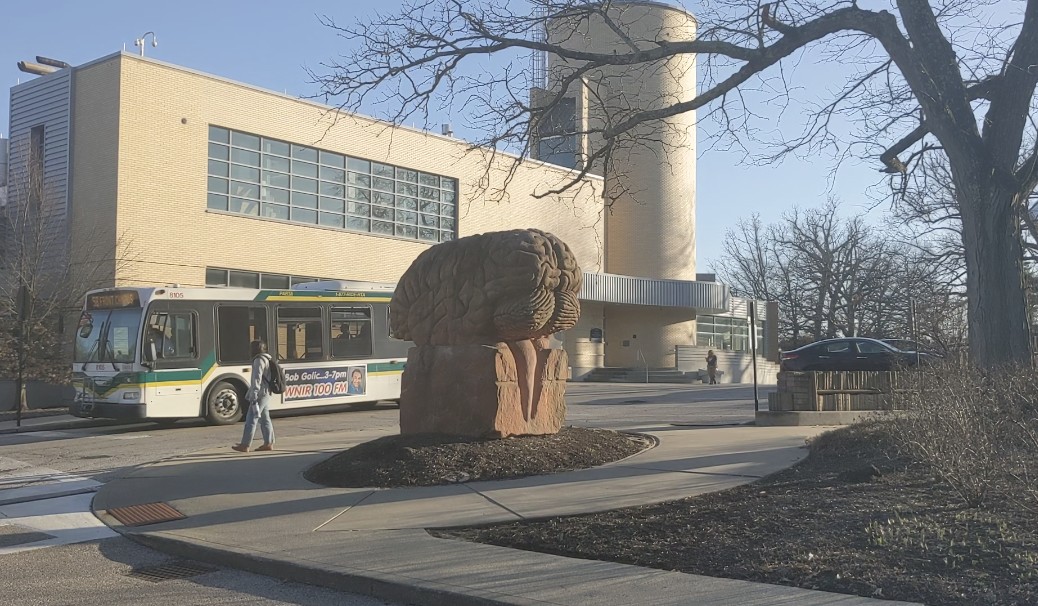A researcher at the university’s Brain Health and Research Institute has made unique discoveries about the spinal cord and its connection with the reproductive system.
Lique Coolen is a professor in the biology department and completed her undergraduate and master’s studies in psychology and earned her doctoral degree in neuroscience. She has been teaching at the university for five years.
Coolen wrote her first paper about the topic in 2016 with the help of her students at the time.
“They were studying sexual reflexes and how the spinal cord was important for those reflexes,” Coolen said. “We spent many years first studying how the spinal cord reflexes are controlled in a non-injured spinal cord. And the reason we were interested in those functions is because those functions are very significantly impaired after spinal cord injury.”
Coolen said one of the main side effects to spinal cord injury is the loss of control in the reproductive system.
A spinal cord injury is described as damage to a bundle of nerves and nerve fibers that send and receive signals from the brain.
Spinal injuries can happen to anyone and are most frequently caused by motor vehicle accidents and serious falls.
It has been discovered that men and women react differently to spinal injuries, in the context of reproductive system dysfunction, but in different ways.
Coolen said that the reproductive system is in jeopardy after an injury because the spinal reflex generators, located in the lumbar (lower) part of the spine, are damaged.
“We study, specifically, a spinal reflex generator for these functions,” she said. “That’s the only one that has been discovered so far, which is covered by my laboratory, and it’s located in a lower level of the spinal cord called the lumbar level of the spinal cord.”
Coolen said that over 90% of men experience “dysfunction related to sexual function” after an injury to the spinal cord.
Michael Lehman, the director of the Brain Health Research Institute found the discovery to be surprising.
“The finding that surprised me the most was the finding that there is this identifiable small group of cells in the spinal cord that are responsible for sexual reflexes,” he said. “The fact that she actually identified it with very convincing studies and evidence…was quite unexpected.”
Lehman completed his doctoral degree in neuroscience from Michigan and has been at the university since 2019.
Coolen said that gene expression can be restored after an injury, in an attempt to repair the damaged reproductive system. Restoring gene expression is Coolen’s primary method to help victims fully recover from spinal cord injuries at this time.
“The next step would be to try to develop treatments to restore those expressions — we’re not there yet,” Coolen said. “Those would be the long-term goals. That’s going to take years to develop.”
Another plan that Coolen is working on is through pharmacological treatments in the hopes of repairing damage to the spinal cord.
“[We want to use] drugs that are being used for other disorders that are already FDA approved, which are not used for this particular purpose,” Coolen said. “We are also doing research to test those drugs and how they can lead to improve the function. And that could go quicker to patient populations because they are already FDA approved but they may be FDA approved for a disease, but have never been tested for this particular purpose.”
Coolen said that there are two avenues that her team is researching for recovery.
The first approach is that researchers could find ways to regenerate the connection that was severed in the spinal cord after the injury.
The second is through pharmacology and using drugs to stimulate the injured part of the spinal cord to kickstart recovery.
That being said, it is unsure if these approaches will result in full or partial recovery, although “any recovery is a fantastic gain for patients,” according to Coolen.
Lehman expressed his gratitude for Coolen’s work and dedication for the last eight years of her research.
“Quite honestly, she’s the best scientist I’ve ever known,” he said. “She is without a doubt the most rigorous, the hardest working and one of the sharpest scientists. She has great ideas. We’re lucky to have her here at Kent State and she’s going to continue to do fantastic work for the rest of her time.”
Coolen said patients routinely identify spinal cord injury and the recovery of the reproductive system as one of the highest priority areas, yet found that few people study the topic.
Despite setbacks from the pandemic and years of research, Coolen and her students still are working to discover an efficient method of recovery for spinal cord injury.
“The emphasis that we have in our research on the effects of spinal cord injury and overcoming the effects of spinal cord injury on sexual function is unique,” she said. “It’s very complicated. That also makes it less attractive for people to study. This is a very, very complex area of research, and I think that makes it difficult.”
John Hilber is the Assistant Sports Editor. Contact him at [email protected].







